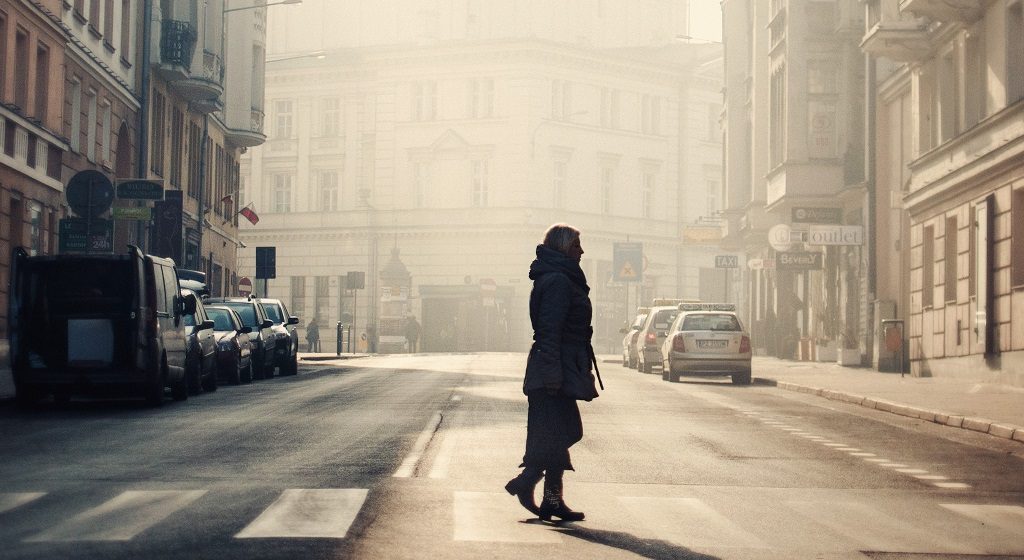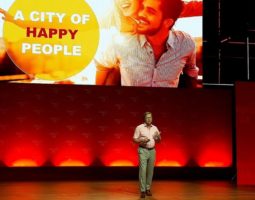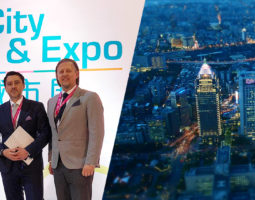Polish cities will lose thousands of inhabitants by 2050. Urban agglomerations of people were designed to increase effectiveness of work. Today they are facing the threat of depopulation. Migration to suburban areas reflects a natural tendency to look for better living conditions.
During the VIIth edition of Smart City Forum I had a pleasure of outlining my concept of „a city of happy people” as a part of „Smart city – what works, that is how to find an appropriate strategy for an intelligent city?”.
 source: private archive
source: private archive

source: private archive

source: private archive
In my opinion, Smart City is a city, whose inhabitants are healthy and productive, and which offers personal growth prospects. What does it mean in practice? Reaching out for such solutions and initiatives that would be useful for people, creating favourable conditions for them to settle, start a family, graduate, set up their own business or find a good job in a given city.
Local governments could fight with the phenomenon of growing depopulation by means of the network of smart solutions, from ensuring safety and clean air, through adequate medical care and friendly urban transport, to increasing tourist and business attractiveness. Thanks to such view on the idea of a smart city, local governments could not only improve their inhabitants’ quality of life, but also fight with the phenomenon of growing depopulation. And this phenomenon is growing year by year. According to the alarming forecast of the Central Statistical Office, by 2050 there will remain only 27 out of 39 metropolitan areas with over 100 000 inhabitants.
Therefore, it’s time to act, and I agree with Mr Marcin Skwierawski, Vice-President of Sopot, who also took part in Smart City Forum, that a broader, holistic view on the problems of modern cities is necessary. There’s a need to combine solutions into one network, a strategy, a project which will influence several spheres and problems at the same time. The example of this may have been connecting a group of public buildings to one external system managing them, which has already started to function in Sopot. Another interesting example is also promoting energy sharing economy through establishing clusters. The idea of circular economy, which was beautifully presented by Beata Klimek, the President of Ostrów Wielkopolski, on the example of her city, is also important.

source: private archive

source: private archive

source: private archive
During Smart City Forum I carefully listened to all conversations, problems and opinions. A presentation of a special guest, Ms Hibaq Jama, a Bristol city councillor, was inspiring. She explained how Bristol became the smartest city in Great Britain, getting ahead even of London. Amsterdam’s case presented by a representative of the City Hall was very interesting. He formulated a very holistic approach to managing a city. Presidential debate during which Maciej Bluj, Vice-President of Wrocław, said that in Smart City the most important thing is a human being, his lifestyle and dynamics of development, with which I totally agreed, was equally interesting.
The subject of „Intelligent infrastructure – mobility in a city of the future” was also very interesting for me. The presentation discussed various solutions improving movement in the city as well as safety, which is equally important for inhabitants.
 source: private archive
source: private archive
One of the most interesting debates was the one devoted to the quality of air, which took place at the end of Smart City Forum and closed two-day sessions. Paweł Pisarczyk, the President of Atende Software Management Board rightly pointed out that the question of improvement of air quality not only had social and health dimension, but also a business one, because we were not competitive at all without it. And we have a lot of work to do in this area. According to a report on air pollution in the cities of the European Union published by WHO, as much as 33 towns out of 50 are Polish agglomerations. That is the reason for which during the second day of Smart City Forum I took the lead at the table no. 4, where we discussed with participants in two rounds how to ensure clean and healthy air in public buildings.
 source: private archive
source: private archive
The conclusion of the VIIth edition of Smart City Forum was also a festive gala, during which the smartest cities in Poland were awarded with prizes. Wrocław was awarded the first place in the category of cities with over 500 000 inhabitants for Vozilla electric car rental service and non-cash urban payments – smart payments. Another winners in particular categories were Rzeszów (100 000 – 500 000 inhabitants), for e-projects in teleinformatics and administration as well as production of green energy, Jaworzno (up to 100 000 inhabitants) and Siemanowice (a distinction). The title of the man of the year was awarded to the President of Nowa Sól, Wadim Tyszkiewicz, to whom I had the honour to present the award in person.








